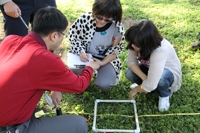
ABOUT MARINE SCIENCE EDUCATION

The Sea Grant Center of Excellence in Marine Science Education is dedicated to building partnerships that enhance marine science education at all levels (Kindergarten through graduate school and the public community) in order to foster understanding of the natural world and the role of humans in it.
Nationwide, ocean and aquatic sciences are among the most underrepresented disciplines in K-12 curricula. This neglect is remarkable considering that the ocean is the dominant feature on planet Earth, whose surface is covered by more than 70 percent water. In fact, the ocean affects every aspect of human life. It

provides most of Earth’s fresh water in the form of rain and most of Earth’s oxygen. The ocean regulates our weather and climate. It supplies foods, medicines, minerals and energy resources. Our environmental sustainability, which ultimately leads to economic and social stability, depends on understanding the processes of the ocean. Current world issues, such as global climate change and collapsing world fisheries, are tied to ocean processes and have local and global implications. As such, it is critical that all people receive access to the resources and materials needed for aquatic and ocean literacy; understanding the mutual influence of the ocean and humankind is a critical component of broader efforts to build scientific literacy for all citizens.
As a reference tool, hundreds of ocean scientists, science educators (K-12 and informal) and learning researchers have developed a set of over-arching concepts that guide the K-12 teaching and learning of ocean sciences. These seven Ocean Literacy Essential Principles (OLEP) constitute the knowledge needed by someone considered to be “scientifically and ocean literate.” (http://oceanliteracy.wp2.coexploration.org/). According to the OLEP, every ocean literate person should understand these essential principles: (1) The Earth has one big ocean with many features, (2) The ocean and life in the ocean shape the features of Earth, (3) The ocean is a major influence on weather and climate, (4) The ocean makes the Earth habitable, (5) The ocean supports a great diversity of life and ecosystems, (6) The ocean and humans are inextricably interconnected, and (7) The ocean is largely unexplored.
In the past year, the center funded TSI teacher institutes in aquatic science on O‘ahu, Kaua‘i, Maui, and Hawai‘i. Three new modules—physical oceanography, biological oceanography, and ecology—are in development. Eventually, these four TSI courses will form a cohesive marine science educator course.
Learn more about the Center for Marine Science Education.
Center for Marine Science Education
2525 Correa Road, HIG 238
Honolulu, HI 96822
Phone: (808) 956-7031
Director
Kanesa Seraphin, Ph.D.
kanesa@hawaii.edu

Each pattern represents a Center of Excellence. Learn more about the cultural connections and meanings behind them.

